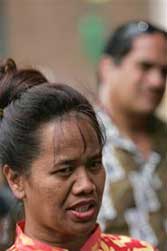Hawaiians sit in at palace, reject U.S. occupation
By
LeiLani Dowell
Published May 8, 2008 9:48 PM
Rejecting the continued U.S. occupation of the sovereign nation of Hawaii, a
group of Native Hawaiians has reconvened its own government, named the
Hawaiian Kingdom Government. On April 30, that government reclaimed the Iolani
Palace, home of the last Hawaiian monarchs before U.S. interests occupied the island nation in 1893. The palace is now run as a museum.
|
Mahealani Kahau, head
of state of the Hawaiian
Kingdom Government,
speaks
to the media after
occupying the ground
of the Iolani Palace.
|
About 70 members of this Hawaiian government arrived at the palace at 5:30 a.m.
on April 30 and posted “No Trespassing” signs on the gates. Guards
with the government, posted at the entrances, explained the action to visitors.
They held the palace for six hours, while employees of the palace museum were
sent home.
Sovereignty activist David Keanu Sai says: “Since the Spanish-American War, 1898, our Nation has been under
prolonged occupation by the United States of America. ... The primary objective
of the Hawaiian Kingdom Government is to expose the occupation of our nation
... and to provide a foundation for transition and the ultimate end of the
occupation of the Hawaiian Kingdom.” The government is part of a broad
sovereignty movement in Hawaii and has registered thousands of Native Hawaiians
and non-Hawaiians as citizens.
U.S. theft of Hawaiian lands
In 1893, Queen Lili’uokalani of the Kingdom of Hawaii was overthrown by a
small group of U.S. citizens and other non-Hawaiians who pretended they were
challenging constitutional changes she was trying to make. That constitution,
which had been forced six years prior—by threat of arms—on the
previous ruler, Lili’uokalani’s brother King David Kalalaua, had
shifted power from the Hawaiian monarchy to the non-Hawaiian elite.
Hawaii was illegally annexed by the U.S. in 1898 and claimed as a state in
1959.
In 1993, a formal “apology” to the Hawaiian people was approved by
the U.S. Congress and signed by President Bill Clinton. It acknowledges that
the overthrow of the Kingdom of Hawaii was plotted by the U.S. minister to
Hawaii. “Without the active support and intervention by the United States
diplomatic and military representatives, the insurrection against the
Government of Queen Liliuokalani would have failed for lack of popular support
and insufficient arms,” it states.
The “apology” further acknowledges that, “The indigenous
Hawaiian people never directly relinquished their claims to their inherent
sovereignty as a people or over their national lands to the United States,
either through their monarchy or through a plebiscite or referendum.”
The illegal occupation of the Hawaiian nation has created untold hardship on
the Hawaiian people, including a depleted population as well as the
disappearance of their language—which children were not allowed to speak
in public schools—and other aspects of their culture.
However, despite the apology the U.S. is loath to give any land back to its
rightful owners, especially given the island nation’s geographical
location. Hawaii now serves as the headquarters of the U.S. Pacific Command,
the largest U.S. armed forces military command in the world
(www.hawaiiankingdom.org) and is the home to large Army, Air Force, Navy and
Marine bases.
Resistance of Native Hawaiians to the political, military and cultural
occupation of their land continues. A growing movement teaches the language to
students so that it is not lost to history.
In 1976 Hawaiian activists occupied the Hawaiian island of Kaho’olawe,
which had been used by the Navy for bombing target practice since the Japanese
attack on Pearl Harbor in 1941. That struggle eventually led to cessation of
bombing on the island in 1990 and the return of the island to the State of
Hawai’i in 1994.
The Hawaiian Kingdom Government plans on returning to the Iolani Palace every
day except the weekends, and conducting its business from the palace grounds.
Mahealani Kahau, the government’s elected head of state, said: “The
Hawaiian Kingdom Government is here and it doesn’t plan to leave. This is
a continuity of the Hawaiian Kingdom of 1892 to today.” (Associated
Press, May 1)
For more information on the Hawaiian Kingdom Government, visit www.higovt.org.
E-mail: ldowell@workers.org
Articles copyright 1995-2012 Workers World.
Verbatim copying and distribution of this entire article is permitted in any medium without royalty provided this notice is preserved.
Workers World, 55 W. 17 St., NY, NY 10011
Email:
ww@workers.org
Subscribe
wwnews-subscribe@workersworld.net
Support independent news
DONATE


